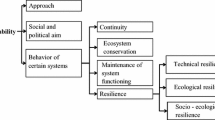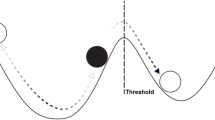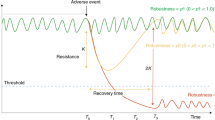Abstract
This paper examines the contribution of resilience thinking for social-ecological systems (SESs) in understanding sustainability and the need to preserve natural resources in the face of external perturbations. Through qualitative and quantitative analysis, the literature survey shows the increased importance of resilience and its integration into the interdisciplinary area of sustainability studies. By exploring the links between resilience and sustainability, the analysis finds that these two concepts share some similarities and also highlight the differences. The discussion of resilience indicators, measuring criteria, models and management issues reveals how resilience contributes to sustainability science and in what ways the concept can be used to measure resilience in terms of sustainability. Most existing studies emphasise the ecological aspects of resilience, but only by including human activities in the modelling can resilience thinking inform sustainability in a meaningful way. The paper concludes defining issues requiring further investigation, such as identifying and managing the drivers and key elements of resilience in SESs, exploring the dynamics between critical variables of SESs and the system feedbacks to external perturbations, as well as evaluating policies and engaging stakeholders for building resilience.



Similar content being viewed by others
References
Adger WN (1997) Sustainability and social resilience in coastal resource use. The Centre for Social and Economic Research on the Global Environment (CSERGE) Working Paper GEC
Adger WN (2000) Social and ecological resilience: are they related? Prog Hum Geogr 24(3):347–364
Adger WN (2003) Building resilience to promote sustainability. Newsl Int Hum Dimens Progr Glob Environm Chang 2:1–3
Adger WN, Hughes TP, Folke C, Carpenter SR, Rockström J (2005) Social-ecological resilience to coastal disasters. Science 309:1036–1039
Ahern J (2011) From fail-safe to safe-to-fail: sustainability and resilience in the new urban world. Landsc Urban Plan 100:341–343
Allen CR, Angeler DG, Garmestani AS, Gunderson LH, Holling CS (2014) Panarchy: theory and application. Ecosystems doi:10.1007/s10021-013-9744-2
Allison HE, Hobbs RJ (2004) Resilience, adaptive capacity, and the “Lock-in Trap” of the Western Australian agricultural region. Ecol Soc 9(1):3
Anderies JM, Janssen MA, Walker BH (2002) Grazing management, resilience, and the dynamics of a fire-driven rangeland system. Ecosystems 5:23–44
Arrow K, Bolin B, Costanza R, Dasgupta P, Folke C, Holling CS, Jansson B, Levin S, Mäler K, Perrings C, Pimentel D (1995) Economic growth, carrying capacity, and the environment. Science 268:520–521
Barnosky AD, Hadly EA, Bascompte J, Berlow EL, Brown JH, Fortelius M, Getz WM, Harte J, Hastings A, Marquet PA, Martinez ND, Mooers A, Roopnarine P, Vermeij G, Williams JW, Gillespie R, Kitzes J, Marshall C, Matzke N, Mindell DP, Revilla E, Smith AB (2012) Approaching a state shift in Earth’s biosphere. Nature 486:52–58
Baudo R (2002) Pollution and recovery of Lake Orta (Italy): resilience at work? Aquat Ecosyst Health Manag 5(1):71–78
Berkes F (2007) Understanding uncertainty and reducing vulnerability: lessons from resilience thinking. Nat Hazards 41:283–295
Berkes F, Folke C (eds) (2000) Linking social and ecological systems: management practices and social mechanisms for building resilience. Cambridge University Press, Cambridge
Berkes F, Colding J, Folke C (2000) Rediscovery of traditional ecological knowledge as adaptive management. Ecol Appl 10(5):1251–1262
Berkes F, Colding J, Folke C (2003) Navigating social-ecological systems: Building resilience for complexity and change. Cambridge University Press, Cambridge
Bhui K (2014) A fine balance in the science of risk and resilience. Brit J Psychiat 204:413–414
Blythe JL (2014) Resilience and social thresholds in small-scale fishing communities. Sustain Sci. doi:10.1007/s11625-014-0253-9
Bruneau M, Chang SE, Eguchi RT, Lee GC, O’Rourke TD, Reinhorn AM, Shinozuka M, Tierney K, Wallace WA, Winterfeldt D (2003) A framework to quantitatively assess and enhance the seismic resilience of communities. Earthq Spectra 19(4):733–752
Bueno N, Basurto X (2009) Resilience and collapse of artisanal fisheries: a system dynamics of a shellfish fishery in the Gulf of California, Mexico. Sustain Sci 4:139–149
Cabell JF, Oelofse M (2012) An indicator framework for assessing agroecosystem resilience. Ecol Soc 17(1):18
Carpenter SR, Ludwig D, Brock W (1999) Management of eutrophication for lakes subject to potentially irreversible change. Ecol Appl 9(3):751–771
Carpenter SR, Walker BH, Anderies JM, Abel N (2001) From metaphor to measurement: resilience of what to what? Ecosystems 4:765–781
Carpenter SR, Westley F, Turner MG (2005) Surrogates for resilience of social-ecological systems. Ecosystems 8:941–944
Clark WC (2007) Sustainability science: a room of its own. Proc Natl Acad Sci USA 104(6):1737–1738
Clark WC, Dickson NM (2003) Sustainability science: the emerging research program. Proc Natl Acad Sci USA 100(14):8059–8061
Conway G (1997) The doubly green revolution: food for all in the twenty-first century. Comstock Publishing Associates, Ithaca
Daly HE (1994) Operationalizing sustainable development by investing in natural capital. In: Jansson AM, Hammer M, Folke C, Costanza R (eds) Investing in natural capital: the ecological economics approach to sustainability. Island Press, Washington DC, pp 22–37
Darnhofer I, Fairweather J, Moller H (2010) Assessing a farm’s sustainability: insights from resilience thinking. Int J Agric Sustain 8(3):186–198
Derissen S, Quaas MF, Baumgärtner S (2011) The relationship between resilience and sustainability of ecological-economic systems. Ecol Econ 70:1121–1128
Endfield GH (2011) The resilience and adaptive capacity of social-environmental systems in colonial Mexico. Proc Natl Acad Sci USA 109(10):3676–3681
Fiksel J (2006) Sustainability and resilience: toward a systems approach. Sustain Sci Pract Policy 2(2):14–21
Folke C (2003) Freshwater for resilience: a shift in thinking. Philos Trans R Soc Lond B Biol Sci 358:2027–2036
Folke C (2006) Resilience: the emergence of a perspective for social-ecological systems analyses. Glob Environ Chang 16:253–267
Folke C (2010) How resilient are ecosystems to global environmental change? Sustain Sci 5:151–154
Folke C, Berkes F, Colding J (2000) Ecological practices and social mechanisms for building resilience and sustainability. In: Berkes F, Folke C (eds) Linking social and ecological systems: management practices and social mechanisms for building resilience. Cambridge University Press, Cambridge, pp 414–436
Folke C, Carpenter SR, Elmqvist T, Gunderson L, Holling CS, Walker BH, et al. (2002) Resilience and sustainable development: building adaptive capacity in a world of transformations. Scientific background paper on resilience for the process of the World Summit on Sustainable Development
Folke C, Carpenter SR, Scheffer M, Elmqvist T, Gunderson LH, Holling CS (2004) Regime shifts, resilience and biodiversity in ecosystem management. Annu Rev Ecol Evol Syst 35:557–581
Folke C, Carpenter SR, Walker BH, Scheffer M, Chapin T, Rockström J (2010) Resilience thinking: integrating resilience, adaptability and transformability. Ecol Soc 15(4):20
Golub A, Mahoney M, Harlow J (2013) Sustainability and intergenerational equity: do past injustices matter? Sustain Sci 8:269–277
Gotts NM (2007) Resilience, panarchy, and world-systems analysis. Ecol Soc 12(2):1–14
Groffman PM, Baron JS, Blett T, Gold AJ, Goodman I, Gunderson LH, Levinson BM, Palmer MA, Paerl HW, Peterson GD, Poff NL, Rejeski DW, Reynolds JF, Turner MG, Weathers KC, Wiens J (2006) Ecological thresholds: the key to successful environmental management or an important concept with no practical application? Ecosystems 9:1–13
Gunderson LH, Holling CS (eds) (2002) Panarchy: understanding transformations in human and natural systems. Island Press, Washington DC
Gunderson LH, Carpenter SR, Folke C, Olsson P, Peterson G (2006) Water RATs (resilience, adaptability, and transformability) in lake and wetland social-ecological systems. Ecol Soc 11(1):16
Gunderson LH, Allen CR, Holling CS (eds) (2010) Foundations of ecological resilience. Island Press, Washington DC
Harris JM (2000) Basic principles of sustainable development. A working paper from Global Development and Environment Institute at Tufts University, Medford
Hirota M, Holmgren M, Van Nes EH, Scheffer M (2011) Global resilience of tropical forest and Savanna to critical transitions. Science 334:232–235
Holdschlag A, Ratter BMW (2013) Multiscale system dynamics of humans and nature in The Bahamas: perturbation, knowledge, panarchy and resilience. Sustain Sci 8:407–421
Holling CS (1973) Resilience and stability of ecological systems. Annu Rev Ecol Syst 4:1–23
Hollnagel E, Pariès J, Woods DD, Leveson N (eds) (2006) Resilience engineering: concepts and precepts. Ashgate Publishing, Aldershot
Hollnagel E, Woods DD, Wreathall J (eds) (2011) Resilience engineering in practice: a guidebook. Ashgate Publishing, Surrey
Hornborg A (2009) Zero-sum world: challenges in conceptualizing environmental load displacement and ecologically unequal exchange in the world-system. Int J Comp Sociol 50(3–4):237–262
Intergovernmental Panel on Climate Change (IPCC) (2014) Summary for policymakers. In: Climate change 2014: impacts, adaptation, and vulnerability. part a: global and sectoral aspects, Contribution of Working Group II to the Fifth Assessment Report. Cambridge University Press, Cambridge, UK
Janssen MA, Schoon ML, Ke W, Börner K (2006) Scholarly networks on resilience, vulnerability and adaptation within the human dimensions of global environmental change. Glob Environ Chang 16:240–252
Jerneck A, Olsson L (2008) Adaptation and the poor: development, resilience and transition. Clim Policy 8(2):170–182
Kinzig AP, Ryan P, Etienne M, Allison H, Elmqvist T, Walker BH (2006) Resilience and regime shifts: assessing cascading effects. In: Walker BH, Anderies JM, Kinzig AP, Ryan P (eds) Exploring resilience in social-ecological systems. CSIRO Publishing, Canberra, pp 139–162
Lambin EF (2005) Conditions for sustainability of human-environment systems: information, motivation, and capacity. Glob Environ Chang 15(3):177–180
Langridge R, Christian-Smith J, Lohse KA (2006) Access and resilience: analyzing the construction of social resilience to the threat of water scarcity. Ecol Soc 11(2):18. http://www.ecologyandsociety.org/vol11/iss2/art18/
Le Maitre D, O’Farrell P (2008) Social-ecological resilience in a dry environment: people and water resources in the Little Karoo. In: Burns M, Weaver A (eds) Exploring sustainability science: a Southern African perspective. Sun Press, Stellenbosch, pp 339–382
Levin SA, Barrett S, Aniyar S, Baumol W, Bliss C, Bolin B, Dasgupta P, Ehrlich P, Folke C, Gren I, Holling CS, Jansson A, Jansson B, Ouml K, Auml R, Dan Martin L, Perrings C, Sheshinski E (1998) Resilience in natural and socioeconomic systems. Environ Dev Econ 3(2):221–262
Ludwig D, Walker BH, Holling CS (1997) Sustainability, stability and resilience. Conserv Ecol 1:1–27
Ludwig D, Mangel M, Haddad B (2001) Ecology, conservation and public policy. Annu Rev Ecol Syst 32:481–517
Magis K (2010) Community resilience: an indicator of social sustainability. Soc Nat Resour 23(5):401–416
Mäler KG, Li CZ (2010) Measuring sustainability under regime shift uncertainty: a resilience pricing approach. Environ Dev Econ 15:707–719
Mihelcic JR, Crittenden JC, Small MJ, Shonnard DR, Zhang Q, Chen H, Sorby SA, James VU, Sutherland JW, Schnoor JL (2003) Sustainability science and engineering: the emergence of a new metadiscipline. Environ Sci Technol 37(23):5314–5324
Milestad R, Darnhofer I (2003) Building farm resilience: the prospects and challenges of organic farming. J Sustain Agric 22(3):81–97
Milman A, Short A (2008) Incorporating resilience into sustainability indicators: an example for the urban water sector. Glob Environ Chang 18:758–767
Muller M (2007) Adapting to climate change: water management for urban resilience. Environ Urban 19:99–113
Mumby PJ, Hastings A, Edwards HJ (2007) Thresholds and the resilience of Carinnean coral reefs. Nature 450:98–101
Nadasdy P (2007) Adaptive co-management and the gospel of resilience. In: Berkes F, Armitage D, Doubleday N (eds) Adaptive co-management: collaboration, learning, and multi-level governance, University of Washington Press, Seattle, pp 208–226
Newman P, Beatley T, Boyer H (2009) Resilient cities: responding to peak oil and climate change. Island Press, Washington DC
Nyström M, Folke C, Mogerg F (2000) Coral reef disturbance and resilience in a human-dominated environment. Trends Ecol Evol 15(10):413–417
Olsson P, Folke C, Berkes F (2004) Adaptive comanagement for building resilience in social-ecological systems. Environ Manag 34(1):75–90
Ostrom E (1990) Governing the commons: the evolution of institutions for collective action. Cambridge University Press, Cambridge
Ott K (2003) The case for strong sustainability. In: Ott K, Thapa PP (eds) Greifswald’s environmental ethics. Steinbecker Verlag Ulrich Rose, Greifwald, pp 59–64
Paerl HW, Valdes LM, Pinckney JL, Piehler MF, Dyble J, Moisander PH (2003) Phytoplankton photopigments as indicators of estuarine and coastal eutrophication. Bioscience 53(10):953–964
Perrings C (1998) Introduction: resilience and sustainability. Environ Dev Econ 3:221
Perrings C (2006) Resilience and sustainable development. Environ Dev Econ 11:417–427
Perrings C, Stern DI (2000) Modelling loss of resilience in agroecosystems: rangelands in Botswana. Environ Dev Econ 16:185–210
Pierce JC, Budd WW, Lovrich NP Jr (2011) Resilience and sustainability in US urban areas. Environ Polit 20(4):566–584
Quinlan A (2003) Resilience and adaptive capacity: key components of sustainable social-ecological systems. Newsl Int Hum Dimens Progr Glob Environm Change IHDP 02:4–5
Resilience Alliance (2012). http://www.resalliance.org/index.php/resilience. Accessed 7 Oct 2014
Rockström J, Steffen W, Noone K, Persson Å, Chapin FS III, Lambin EF, Lenton TM, Scheffer M, Folke C, Schellnhuber HJ, Nykvist B, de Wit CA, Hughes T, van der Leeuw S, Rodhe H, Sörlin S, Snyder PK, Costanza R, Svedin U, Falkenmark M, Karlberg L, Corell RW, Fabry VJ, Hansen J, Walker B, Liverman D, Richardson K, Crutzen P, Foley JA (2009) A safe operating space for humanity. Nature 461:472–475
Rutter M (1993) Resilience: some conceptual considerations. J Adolesc Health 14(8):626–631
Scheffer M (1993) Alternative equilibria in shallow lakes. Trends Ecol Evol 8(8):275–279
Scheffer M, Brock W, Westley F (2000) Mechanisms preventing optimum use of ecosystem services: an interdisciplinary theoretical analysis. Ecosystems 3:451–471
Scheffer M, Carpenter SR, Foley J, Folke C, Walker BH (2001) Catastrophic shifts in ecosystems. Nature 413(6856):591–596
Scheffer M, Carpenter SR, Lenton TM, Bascompte J, Brock W, Dakos V, van de Koppel J, van de Leemput IA, Levin SA, van Nes EH, Pascual M, Vandermeer J (2012) Anticipating critical transitions. Science 338:344–348
Scheufele G, Bennett J (2012) Valuing ecosystem resilience. J Environ Econ Policy 1(1):18–31
Steneck RS, Graham MH, Bourque BJ, Corbett D, Erlandson JM, Estes JA, Tegner M (2002) Kelp forest ecosystems: biodiversity, stability, resilience and future. Environ Conserv 29(4):436–459
Throsby D (1999) Cultural capital. J Cult Econ 23:3–12
Throsby D (2009) Sustainability and culture some theoretical issues. Int J Cult Policy 4(1):7–19
Todorov V, Marinova D (2011) Modelling sustainability. Math Comput Simul 81(7):1397–1408
Tompkins EL, Adger WN (2004) Does adaptive management of natural resources enhance resilience to climate change? Ecol Soc 9(2):10
Tusaie K, Dyer J (2004) Resilience: a historical review of the construct. Holist Nurs Pract 18(1):3–10
Walker BH (1993) Rangeland ecology-understanding and managing change. Ambio 22(2–3):80–87
Walker BH, Meyers JA (2004) Thresholds in ecological and social-ecological systems: a developing database. Ecol Soc 9(2):3
Walker BH, Salt D (2006) Resilience thinking: sustaining ecosystems and people in a changing world. Island Press, Washington DC
Walker B, Salt D (2012) Resilience Practice: building capacity to absorb disturbance and maintain function. Island Press, Washington DC
Walker BH, Carpenter SR, Anderies J, Abel N, Cumming G, Janssen M, Lebel L, Norberg J, Peterson GD, Pritchard R (2002) Resilience management in social-ecological systems: a working hypothesis for a participatory approach. Conserv Ecol 6(1):14
Walker BH, Holling CS, Carpenter SR, Kinzig A (2004) Resilience, adaptability and transformability in social-ecological systems. Ecol Soc 9(2):5
Walker BH, Abel N, Anderies JM, Ryan P (2009) Resilience, adaptability, and transformability in the Goulburn-Broken catchment Australia. Ecol Soc 14(1):12
Walker BH, Sayer J, Andrew NL, Campbell B (2010a) Should enhanced resilience be an objective of natural resource management research for developing countries? Crop Sci 50:10–19
Walker BH, Pearson L, Harris M, Mäler KG, Li CZ, Biggs R, Baynes T (2010b) Incorporating resilience in the assessment of inclusive wealth: an example from South East Australia. Environ Resour Econ 45(2):183–202
Walsh F (1996) The concept of family resilience: crisis and challenge. Fam Process 35(3):81–85
White JM, Stromberg JC (2011) Resilience, restoration, and riparian ecosystems: case study of a dryland, urban river. Restor Ecol 19(1):101–111
Xu L, Marinova D (2013) Resilience thinking: a bibliometric analysis of socio-ecological research. Scientometrics 96:911–927
Acknowledgments
All authors thank the Editor and three anonymous referees whose comments helped improve this survey. The second and third authors acknowledge the financial support of the Australian Research Council.
Author information
Authors and Affiliations
Corresponding author
Additional information
Handled by Victor Savage, National University of Singapore, Singapore.
Rights and permissions
About this article
Cite this article
Xu, L., Marinova, D. & Guo, X. Resilience thinking: a renewed system approach for sustainability science. Sustain Sci 10, 123–138 (2015). https://doi.org/10.1007/s11625-014-0274-4
Received:
Accepted:
Published:
Issue Date:
DOI: https://doi.org/10.1007/s11625-014-0274-4




